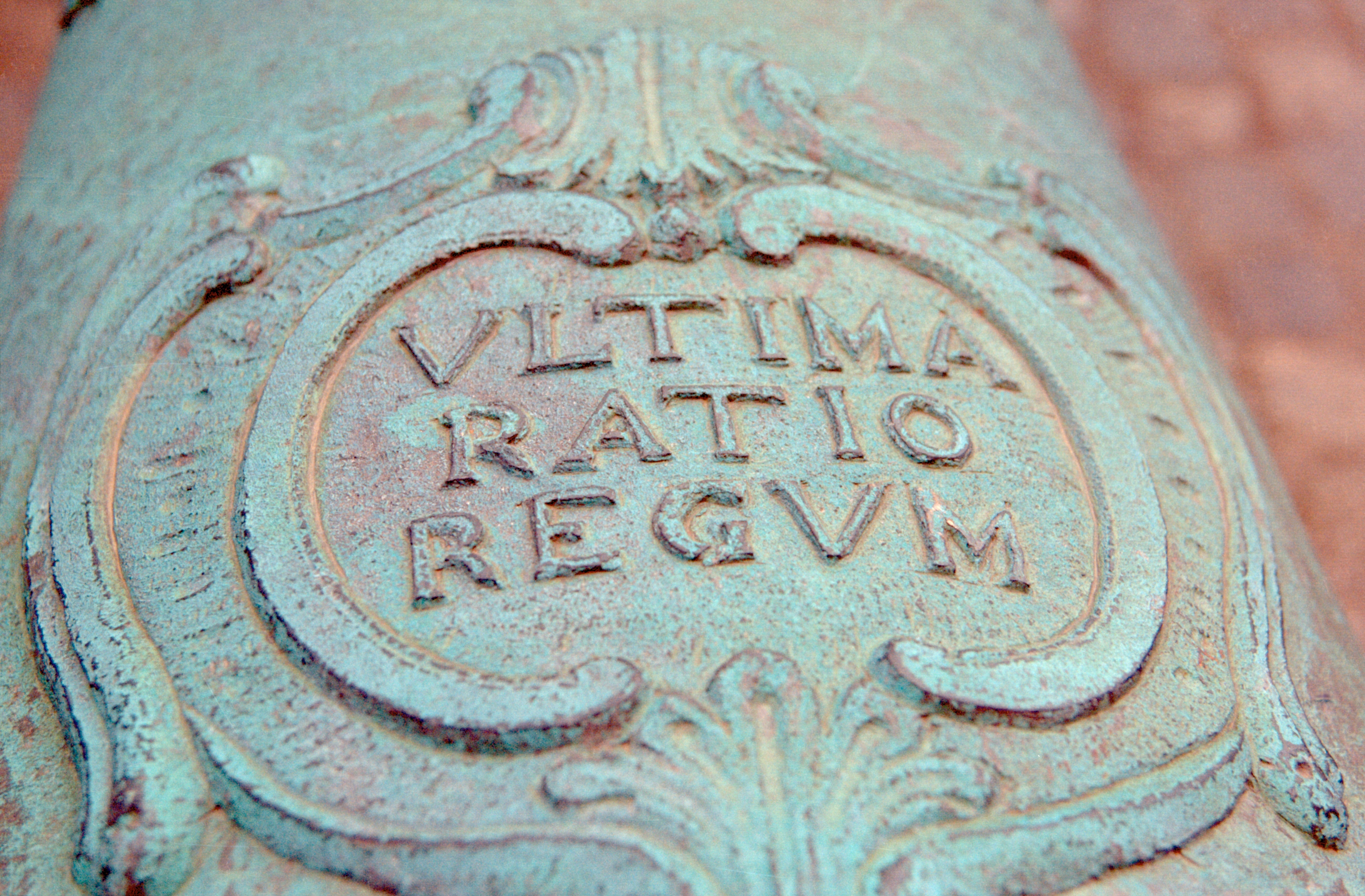King Louis XIV — the “Sun King” famous for his pronouncement that he was the state — had this phrase inscribed upon the cannon used in a redoubt, one preserved for the specific intention of quelling a popular uprising.
In later years, Frederick the Great would inscribe a similar epitaph on his own cannon as he repelled French, Austrian, Bavarian, and Russian incursions into his own country’s rise to power.
Within both examples — the French bureaucracy of Versailles and the Prussian Army’s rigid and disciplinarian society — is embedded the final argument of sovereignty. Those with the guns make the rules, and Frederick and Louis knew that the final argument of kings dictated who was supremely sovereign within their domains without question — the will of the king.
Upending this will goes back to the days of John Churchill, Duke of Marlborough whose polyglot army of English, Scots, Irish, Dutch and Germans sliced through the Spanish Netherlands in the early 18th century before wrecking the French army at Blenheim and Ramillies respectively.
The stakes then were simple. Great Britain was still reeling from the Cromwellian Protectorate and the convulsions after the Glorious Revolution, with ancient Saxon ideas of kinship and clan (and Magna Carta) still prevailing over the will of tyrants and so-called noblemen. On continental Europe, authoritarian kings who ruled by divine right consolidated and aggregated their power, thus ending centuries of separation of powers/estates inherited from the Holy Roman Empire between nobles, bishops, and commons.
It was Marlborough who broke the back of French authoritarian power on the continent, propping up two weak Habsburg dynasties in Spain (exhausted) and Austria (still recovering from the 1689 siege of Vienna) while denying France domination over the squabbling German principalities. Marlborough’s lieutenants would be instantly recognizable to Virginians — Spotswood, Parke, Wheeler, Drysdale, Hamilton among others, and with them they brought Marlborough’s unique combination of military leadership and noblesse oblige informed the consciences of not only Marlborough’s inner circle, but their subordinates as well — Lawrence Washington among them.
What Marlborough’s lieutenants brought to America was a unique form of governance, one that welded together a tradition of resistance to “divine right” with the discipline of the gentleman soldier. Colonial America’s leaders would emulate these examples, and as the English Crown morphed into the British Empire and the British government began altering its own forms much as Louis XIV had done 100 years earlier, it would be the sons of Marlborough who would resist in the manner of their progenitors — with sword, bayonet, and gundpowder.
What Louis XIV, Frederick the Great, and George III all understood was that as regent, the state own a monopoly on both the means and application of violence — and the will to impose such measures was personified in the king himself. What the Americans had learned from Marlborough’s lieutenants was that tyrants who employed the ultima ratio regum could not only be combated, but defeated through a steady employment of logistics, will, and time — not with a competing logic of kings fighting kings, but a free people who would not have power monopolized by a distant authority.
The final argument of kings has long been the gun. Kings and emperors and sultans knew this, and long sought to monopolize the argument.
Yet the resistance to such a monopolization of power held a long tradition in the English-speaking world, exemplified by men such as Marlborough and adopted by his lieutenants — and finally by the Founders themselves. Lest the argument be lost on others, let Patrick Henry make the most convincing case of the link:
“Are fleets and armies necessary to a work of love and reconciliation? Have we shown ourselves so unwilling to be reconciled, that force must be called in to win back our love? Let us not deceive ourselves, sir. These are the implements of war and subjugation; the last arguments to which kings resort. I ask, gentlemen, sir, what means this martial array, if its purpose be not to force us to submission? Can gentlemen assign any other possible motive for it? Has Great Britain any enemy, in this quarter of the world, to call for all this accumulation of navies and armies? No, sir, she has none. They are meant for us; they can be meant for no other. They are sent over to bind and rivet upon us those chains which the British ministry have been so long forging. And what have we to oppose to them? Shall we try argument?”
Henry had precisely one argument in mind. The only questions remaining were who would wield it, and to what purpose.
This is the wisdom of the Second Amendment. The ultima ratio regum would not longer be held by a distant sovereign, but rather by the people who are sovereign unto themselves. Our Bill of Rights and Constitution, designed for the purpose of constraining government and not citizens, enshrines this right not because of some slavish devotion to individualism, but rather because the alternative to “who decides?” is often the corruptible vultures who desire nothing more than to rule over and decide the destinies of other men.
It is long argued that the Second Amendment exists to defend the First Amendment, and as a consequence, we should be as violently opposed to any infringement of our 2A rights as we would be on our 1A rights.
After all, once we no longer trust our neighbors in the great task of self-government, where does the forfeiture of our natural rights end? The answer simply is that it does not end, and eventually is recovered by a human spirit that will neither tolerate nor endure enslavement for long.
This is the reason why the final argument of kings in America rests in the hands of citizens, not because of some slavish devotion to violence and gun culture, but because the final argument does not and should never rest in the hands of either government’s enforcers or our self-determined superiors, but ourselves alone.
The long tradition of Anglo-Saxon liberty in the face of continental tyranny is a defining feature of the English-speaking peoples. So wrote Marlborough’s descendant — Winston Churchill — who was made famous for resisting a different form of continental tyranny. It is the one thing that our friends on the left — sincere as they are — will never truly contemplate or understand about the innate yet inexplicable reasons why Americans patriotically refuse to abridge this sovereign right.
History demonstrates the pitfalls, after all.






